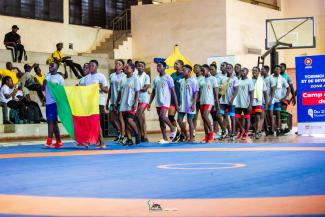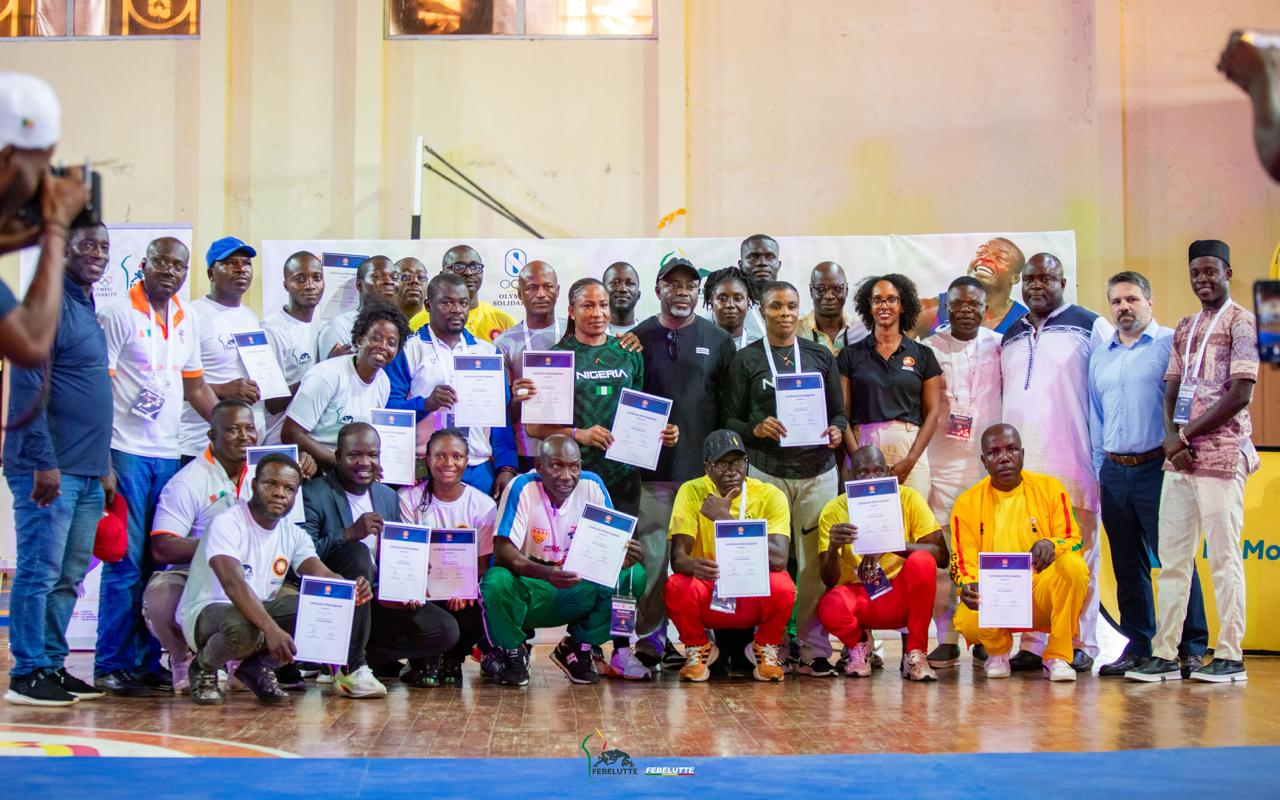Russia Completes Olympic Freestyle Lineup as Kozyrev Qualifies at 125kg; US falls short
Thursday, May 6, 2021 - 20:11 By Ken Marantz

Sergei KOZYREV (RUS) assured that Russia would join Iran in sending a full freestyle team to the Tokyo Olympics, while Jordan OLIVER (USA) came up just short of adding the United States to that list.
Kozyrev hung on to an early lead to defeat Daniel LIGETI (HUN) 3-2 in the 97kg semifinals at the final world Olympic qualifying tournament on Thursday night in Sofia, Bulgaria.
"I had no pressure of qualifying Russia because I am mentally very strong," said Kozyrev, who was coming off a silver medal performance at the European Championships.
With the two finalists in each weight class earning Olympic berths for their countries, Kozyrev's victory gave Russia an entry in all six freestyle weight classes. Iran had completed the set at last month's Asian Olympic qualifier in Almaty.
Olympic host Japan doubled its number of freestyle berths when both Yuki TAKAHASHI (JPN) at 57kg and Sohsuke TAKATANI (JPN) at 86kg won their semifinal matches. Japan had previously qualified at 65kg and 74kg at the 2019 World Championships in Nursultan, then failed to add to the total at the Asian qualifier.
Japan was only country with multiple semifinal winners, as 10 others picked up one Olympic berth each.
For Slovenia, however, the wait for a first-ever Olympic wrestler goes on after American-based David HABAT (SLO) came up just short at 65kg, losing 9-7 to Georgios PILIDIS (GRE) after falling far behind early.

Habat rebounded after spotting Pilidis a seven-point lead to go into the second period trailing 7-4. But Pilidis scored 2 points off a counter to a tackle, and that would prove the difference when Habat scored a stepout and a takedown later on. The match ended with Pilidis desperately clinging onto Habat's leg.
"Everything was good because I was preparing very hard for this," Pilidis said. "I had a lot of injuries and this is only my second time wrestling at 65kg. It's a new weight category for me."
Rio 2016 Olympic bronze medalist Albert SARITOV (ROU) earned a chance to earn another medal when he rallied to a 3-2 victory over Valerii ANDRIITSEV (UKR) in the 97kg semifinals.
Andriitsev gained an activity point and a stepout to lead 2-0 after the first period, and Saritov did not get on the scoreboard until receiving an activity point with 1:03 left in the match. But he managed to get behind the Ukrainian and pull him backwards to the mat for a 2-point takedown with :20 to go.
Whether it was the pressure or just the closeness of the competition, none of the semifinal matches were decided by a fall or technical fall; in fact, only one wrestler scored in double-figures, and eight of the 12 matches were decided by two points or less.
Magomedkhabib KADIMAGOMEDOV (BLR) was the high-scorer of the round when he emerged from the stacked 74kg division with an Olympic ticket by outclassing newly crowned European champion Taimuraz SALKAZANOV (SVK) 12-4 in a clash of former Russians.
Kadimagomedov, the 2020 European gold medalist at 79kg, padded a 4-1 lead with a 4-point counter lift in the second period, then added two takedowns off counters to cool off Salkazanov.
"Today is the biggest win of my career no doubt because it's my dream to compete at the Olympics," said Kadimagomedov, a 79kg bronze medalist at last December's Individual World Cup.
The other Tokyo ticket at 74kg was won by Vasyl MYKHAILOV (UKR), who scored a pair of second-period takedowns to defeat European bronze medalist Mitchell FINESILVER (ISR) 4-2.
"It was a difficult bout because it was hard to control my weight as I am cutting 8 kgs," Mykhailov said. "In the end I was able to do it and reach my goal of qualifying."
Japan's Takahashi, the 2017 world champion, started the session with a 2-0 victory at 57kg over Reineri ANDREU (CUB), marking his third career win over the Cuban, none of which have been by more than two points.

On the activity clock in the first period, Takahashi scored a single-leg takedown to take a lead that he neither added to nor lost. Andreu found few openings in Takahashi's defenses, but the one time he got through in the second period, the Japanese wriggled out of the predicament to clinch the win.
The victory caps a remarkable journey for Takahashi, a two-time world medalist who failed to earn an Olympic place when he finished 10th in Nursultan. After that, he lost out to Rio 2016 Olympic silver medalist Rei HIGUCHI (JPN) for the chance to go to the Asian qualifier.
But when Higuchi failed to make weight in Almaty, the Japan federation called on Takahashi to make the trip to Sofia, and he responded with a solid performance. Next he will have to face Higuchi in a playoff for the Olympic spot on a date to be determined.
"At the 2019 World Championships, I wasn't able to secure an Olympic berth," Takahashi said. "And then, I lost in the final at the All-Japan Championships, so I was not the No. 1 representative. Here in Bulgaria among many people I was able to make the final, so I'm very happy. It was very difficult to win."
The other 57kg place also went to Asia when 2018 Asian Games champion Bekhbayar ERDENEBAT (MGL) scored two takedowns in the second period to defeat three-time former European champion Giorgi EDISHERASHVILI (AZE) 6-2.
"I had no perfect plan for this and I had only winning in my mind," Erdenebat said. "When it was COVID, I was just training all the time. I lost at the Mongolian Open and failed to win the chance to wrestle in Almaty."
At 65kg, two-time world medalist Magomedmurad GADZHIEV (POL) denied the United States a full team in Tokyo when he outlasted Oliver 3-2.

Gadzhiev, the 2020 European champion at 70kg, scored all of his points in the first period with two stepouts and an activity point. Oliver scored a takedown with a powerful double-leg tackle with :45 left, but it would prove too little too late.
"This is a very difficult weight and I can’t like one bout as all of them were tough," said Gadzhiev, yet another of the successful transplanted Russians. "This was only the second time I am wrestling at this weight and I cut a lot of weight to prepare for the Olympics."
At 86kg, Japan's Takatani made sure not to allow a lapse that cost him at the Asian qualifier in grinding out a 7-2 victory over Zbigniew BARANOWSKI (POL). Takatani scored three takedowns with his single-leg attack and was never in danger.
"The Olympics will be held in my country, so I want to use this honor to flourish in Tokyo," said Takatani, the 2014 world silver medalist at 74kg who will be making his third Olympic appearance.
"At the Asian qualifying tournament, my movement was off and I couldn't do my strongpoint of tackling and string together points. In the match against the Chinese, I thought the referee misjudged the situation. But a friend told me, in wrestling there are aspects not written in the rulebook. You can't put your fate into the referee's hands. In this tournament, I was determined to win with my weapons."
In the other 86kg semifinal, Russian-born Boris MAKOEV (SVK) scored all of his points in the second period to notch a razor-thin 4-4 decision over Abubakr ABAKAROV (AZE).
Abakarov, the 2019 world U23 silver medalist at 79kg, sandwiched a pair of stepouts around a takedown for a 4-0 first period lead. But Makoev came back with a 2-point exposure off a tackle attempt, then added a 2-point gut wrench to go ahead on criteria.
The match ended with Makoev escaping after Abakarov latched onto a single leg, and then avoiding a stepout in the final seconds.
"It was a long and hard way but thank God I am qualified," Makoev said. "I prepared so hard for this and to qualify for the Olympics. In the beginning, my wrestling was not good but as the day progressed, I got better and I was able to defeat my opponents."
Italy picked up its second ticket to Tokyo when 2018 world bronze medalist Cuban-born Abraham CONYEDO RUANO (ITA) eked out a 3-2 win over Russian-born Ahmed BATAEV (BUL) at 97kg.

"All of the bouts today were so difficult for me but I have to thank my coaches who prepared me," Conyedo Ruano said. "This is my first Olympic qualification at senior level and I can’t believe it. It’s the most beautiful moment of my sporting career."
Conyedo Ruano led 3-0 on an activity point and two stepouts before Bataev came to life and scored a takedown with :40 left, but the Italian was able to finish him off.
"My wrestling is based on tactic and aggression and that is what gave me victory here in the semifinal," Conyedo Ruano said.
In the final bout of the session, 2019 Asian bronze medalist Sumit MALIK (IND) scored two takedowns off counters in the second period to clinch a 5-0 victory over Jose DIAZ ROBERTTI (VEN) at 125kg.
"I am very happy with this win and all my four bouts were so difficult," said Malik, who finished third at the Asian qualifier. "The semifinal was my best
"I would have qualified in Almaty as well, but I had an injury because of which I could not perform to my potential."
The semifinalists will be back Friday night for the medal round matches, where they will be wrestling for pride.
Meanwhile, the women will be in action with the final two Olympic berths up for grabs in the six weight classes.
Freestyle Results
57kg (23 entries)
SEMIFINAL - Yuki TAKAHASHI (JPN) df. Reineri ANDREU (CUB), 2-0
SEMIFINAL - Bekhbayar ERDENEBAT (MGL) df. Giorgi EDISHERASHVILI (AZE), 6-2
65kg (28 entries)
SEMIFINAL - Georgios PILIDIS (GRE) df. David HABAT (SLO), 9-7
SEMIFINAL - Magomedmurad GADZHIEV (POL) df. Jordan OLIVER (USA), 3-2
74kg (29 entries)
SEMIFINAL - Vasyl MYKHAILOV (UKR) df. Mitchell FINESILVER (ISR), 4-2
SEMIFINAL - Magomedkhabib KADIMAGOMEDOV (BLR) df. Taimuraz SALKAZANOV (SVK), 12-4
86kg (30 entries)
SEMIFINAL - Sohsuke TAKATANI (JPN) df. Zbigniew BARANOWSKI (POL), 7-2
SEMIFINAL - Boris MAKOEV (SVK) df. Abubakr ABAKAROV (AZE), 4-4
97kg (19 entries)
SEMIFINAL - Abraham CONYEDO RUANO (ITA) df. Ahmed BATAEV (BUL), 3-2
SEMIFINAL - Albert SARITOV (ROU) df. Valerii ANDRIITSEV (UKR), 3-2
125kg (20 entries)
SEMIFINAL - Sergei KOZYREV (RUS) df. Daniel LIGETI (HUN), 3-2
SEMIFINAL - Sumit MALIK (IND) df. Jose DIAZ ROBERTTI (VEN), 5-0



Share your thoughts.
Comments